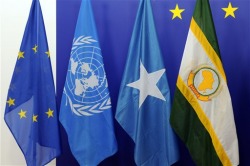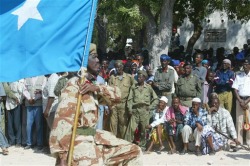Somalia: Politics

Change is in the Air
Somalia: Politics
Since the Somali Civil War of 1991, politics and the government have been thrown into what seems to be never ending chaos. After the collapse of their government, groups that organized around military leaders have taken full political control of Somalia. This form of government is also known as “warlordism”, where leaders with military power control areas of the country with the support of armed factions (Encyclopædia Britannica). If Somalia continues to direct their country down this road, bloodshed, chaos and violence are certain to follow. It’s time for change in Somalia! Somalia needs to recreate their
government system because, without this change, the country will continue down a dark path.
The Somali government is currently in total chaos, creating conflicts and promoting violence. Without this change I am proposing, thousands of Somali residents will continue to be put in harms way. The reason for their chaotic government is due to their late dictator, Siyad Barre, who created a form of government that would benefit himself (Culture and Customs of Somalia). Under his control, opposing political parties were oppressed, creating inequality while promoting conflict and bloodshed (Encyclopædia Britannica). Somali civilians have been fearful and distrustful of any centralized power. Although this form of government is clearly flawed, it has been allowed to propagate and continue. For Somalia to grow economically, politically, and military wise it will need the support of its own citizens. If Somalia continues this form of unorganized chaotic government, it is sure to spiral into a complete downfall, creating many violent uproars and revolutions like the 1991 Somali Civil War which claimed hundreds of innocent Somali lives. Re-creating the Somali government would encourage organized structure that allows for accountable responsibility. The result would encourage leaders worthy of their positions to join ranks while strengthening the door closing on a history of corruption.
Somalia’s current clan structure has sustained them in harsh environments for centuries, but makes it difficult to create and enforce a centralized state. This form of government always just gets the country by, never creating prosperous times. Somalia is in need of a stable government. Although their current form of government may have sustained the country for all of Somalia’s existence, the world is changing now and a centralized approach is needed (Four African Political Systems). Somalia’s current form of government creates a fragmented country, where the various regions and clans focus on their differences causing conflict and violence (Language, and Thought: The Somali Experience). This form of government is a ticking time bomb, creating tension between fellow countrymen and weaving throughout the government. The country has been split for centuries and continues to be divided today. It’s time for uniting Somalia towards accomplishing goals together. The current system is corrupted and oppresses new ideas, hindering Somalia’s growth.
This change is vital to Somalia. Millions of lives are in the hands of an inept and corrupt government focused not on the needs of its people, but on the depth of it’s personal pockets and the power it can unjustly wield. Warlords focused on their own interest are neither qualified or deserving to lead this country. Implementing a democratic republic would turn Somalia in a new direction. Government reform and unity of a central state would finally be within reach for this country. Somalia should seize the opportunity to learn from its past mistakes, applying that knowledge to generate change. As the Somali citizens ask how they can best step out from the effects of civil war, poverty and crime, the answer can not be found in the continuation of warlordism, corruption and oppression. A government made up of individuals with only their personal gains in mind at the expense of a national population will ultimately propel its citizens further down the spiral. This change to a democratic republic would benefit millions, creating equality and gaining the support of those it will serve.
"Somalia." Encyclopædia Britannica. 2009. Encyclopædia Britannica Online. 20
May. 2009 <http://www.britannica.com/EBchecked/topic/553877/Somalia>.
Laitin, David D. Politics, Language, and Thought: The Somali
Experience. Chicago: University of Chicago Press, 1977.
Pothholm, Christian P. Four African Political Systems.
Englewood Cliffs, New Jersey: Prentice-Hall, 1970.
Abdullahi, Mohamed Diriye. Culture and Customs of Somalia. Westport, Conn.: Greenwood Press, 2001.
Last updated May 22, by Cam Kyle.

